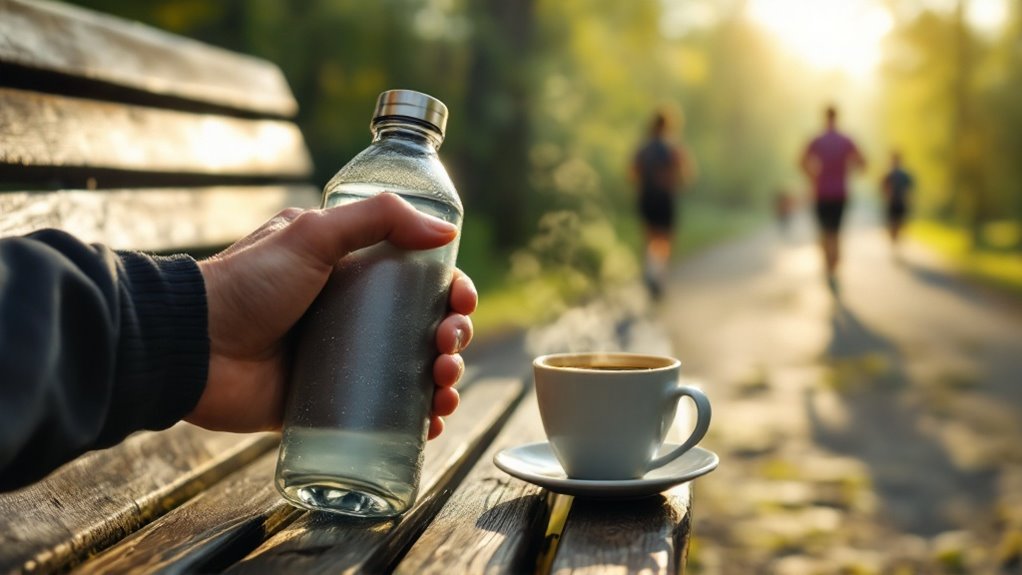



You've probably heard that coffee can perk you up, but did you know it might also ease your post-workout muscle pain? Caffeine, found in your morning brew, blocks adenosine receptors, potentially reducing inflammation and pain signals. Studies suggest that a moderate dose—about two cups of coffee—can cut delayed-onset muscle soreness by nearly half within 24-48 hours. But here's the catch: it works better for those who don't drink coffee regularly, and timing matters. Could your post-exercise recovery be as simple as sipping a cup of coffee? The answer isn't as straightforward as you might think.
Key Takeaways
- Caffeine reduces delayed-onset muscle soreness (DOMS) by up to 48%, especially effective 24-48 hours post-exercise.
- A moderate dose (2 cups of coffee) before exercise lowers muscle pain and enhances recovery on days 2 and 3.
- Caffeine blocks adenosine receptors, reducing inflammation and pain signaling, making it more effective than some common painkillers.
- Optimal dosage is 5 mg/kg body weight, consumed 1 hour before exercise for peak pain-relieving effects.
- Non-habitual caffeine users experience greater pain relief, but excessive intake may cause side effects like insomnia or jitteriness.
How Caffeine Affects Muscle Pain
Caffeine reduces muscle pain by blocking adenosine receptors, which play a key role in inflammation and pain signaling. When you exercise, adenosine activates pain receptors during the inflammatory response, contributing to post-exercise muscle soreness. By inhibiting adenosine, caffeine disrupts this process, providing pain relief. Studies show caffeine ingestion reduces delayed onset muscle soreness (DOMS), particularly on days 2 and 3 post-exercise, aiding recovery. During maximal voluntary isometric contractions, caffeine decreases pain intensity by 12.7 units compared to placebo. Its hypoalgesic effect is more pronounced in low-caffeine consumers, with 5 mg/kg body weight markedly reducing muscle soreness. This mechanism allows caffeine to alleviate pain during and after exercise, making it a practical option for managing exercise-induced muscle discomfort.
Study Findings on Caffeine and DOMS
Studies show caffeine reduces delayed-onset muscle soreness (DOMS) by blocking adenosine receptors, which decreases pain perception during muscle inflammation. Its effectiveness varies with dosage, with low-caffeine consumers experiencing greater pain relief compared to habitual users. Incorporating caffeine post-exercise may enhance recovery by substantially lowering muscle soreness, especially within 24 to 48 hours after intense activity.
Pain Reduction Mechanisms
While exploring how caffeine impacts muscle recovery, it's clear that its ability to block adenosine receptors plays a key role in reducing delayed-onset muscle soreness (DOMS). Caffeine acts as an adenosine antagonist, inhibiting adenosine receptors that contribute to inflammation and pain signaling in post-workout muscle. This adenosine antagonist action reduces pain perception, making caffeine an effective hypoalgesic agent. Studies show caffeine can decrease muscle pain by up to 48% during maximal force tests and 26% during sub-maximal efforts, outperforming common painkillers like naproxen and aspirin. Its pain reduction mechanisms are particularly effective in non-regular caffeine consumers, as tolerance can diminish its benefits. By targeting adenosine receptors, caffeine directly alleviates muscle soreness, offering a scientifically supported method to manage exercise-induced discomfort.
Caffeine Dosage Effects
The effectiveness of caffeine in reducing delayed-onset muscle soreness (DOMS) is closely tied to dosage. Studies show that a caffeine dosage of 5 mg/kg body weight, equivalent to two cups of coffee, reduces DOMS by 48% during maximal force tests. Resistance-trained individuals experience greater pain reduction with higher doses (5-6 mg/kg) compared to lower doses (1-3 mg/kg). During sub-maximal force tests, caffeine decreases muscle pain by 26% compared to placebo. Its analgesic effects peak 24-48 hours post-exercise, with significant pain reduction on days 2 and 3. Meta-analyses confirm caffeine's consistent pain-relieving effects, with a large effect size (Cohen's d = -0.88) during maximal voluntary contractions. Ideal caffeine dosage enhances its ability to alleviate DOMS, particularly in active individuals.
Exercise Recovery Benefits
When consumed after exercise, caffeine can markedly reduce delayed-onset muscle soreness (DOMS) and improve recovery outcomes. Studies show caffeine reduces DOMS by 12.7 units during maximal voluntary isometric contractions (MVIC) 24-48 hours post-exercise. It also increases MVIC force by 4.4%, enhancing muscle force recovery after eccentric exercise. Caffeine's hypoalgesic effect, linked to its role as an adenosine antagonist, blocks pain and inflammation signaling, aiding pain reduction. This effect is more pronounced during maximal contractions (12.7 units) than submaximal movements (7.8 units). By mitigating muscle soreness and improving muscle force output, caffeine supports faster and more effective exercise recovery, particularly following strenuous or eccentric activities. These findings highlight caffeine's potential to optimize recovery quality and reduce post-exercise discomfort.
Mechanisms Behind Caffeine's Pain Relief
Caffeine's ability to reduce muscle pain after exercise stems from its role as an adenosine antagonist. By blocking adenosine receptors, caffeine inhibits the activation of pain pathways in peripheral afferent nerves and skeletal muscle. This action reduces inflammation and muscle soreness, as adenosine normally promotes pain signaling during tissue stress. Additionally, caffeine's hypoalgesic effect dampens central nervous system activity, further alleviating discomfort. Its interaction with adenosine receptors in the central and peripheral nervous systems makes it more consistent than over-the-counter painkillers like ibuprofen. By targeting these receptors, caffeine effectively reduces the perception of pain, helping you recover faster and with less discomfort after intense physical activity.
Caffeine Dosage and Timing for Recovery
To maximize caffeine's pain-relieving effects, aim for a dosage of 5 mg/kg body weight, roughly equivalent to 2.5 cups of brewed coffee, consumed 1 hour before exercise. This timing aligns with peak plasma caffeine concentration, enhancing its analgesic impact during and after physical activity. Non-habitual users may experience greater relief due to lower tolerance, while consistent daily intake for up to 4 days post-exercise can further reduce muscle soreness.
Optimal Caffeine Dosage
Although caffeine's effects on muscle recovery are well-documented, determining the ideal dosage and timing is key to maximizing its benefits. Research shows that a caffeine dosage of 5 mg/kg body weight, roughly equivalent to 2.5 cups of coffee, markedly reduces delayed-onset muscle soreness (DOMS) and enhances recovery. Even lower doses, such as 3 mg/kg, can still provide measurable pain relief and reduce perceived exertion post-exercise. For peak results, caffeine ingestion should align with peak plasma concentration, typically 1 hour before exercise. Daily caffeine consumption at this dosage for up to 4 days post-exercise can further attenuate muscle soreness and improve recovery outcomes. Since caffeine has a half-life of 5 hours, its effects persist, supporting prolonged recovery and pain relief.
Timing for Maximum Relief
The timing of caffeine intake plays a significant role in maximizing its pain-relieving effects during recovery. For delayed-onset muscle soreness (DOMS), consuming caffeine (~5 mg/kg body weight) one hour before exercise aligns with peak plasma caffeine concentration, reducing soreness by up to 48%. Post-exercise, daily caffeine ingestion for four days enhances recovery, with the greatest pain relief observed on days 2 and 3. A moderate dose (equivalent to ~2 cups of coffee) is effective, but higher doses may increase side effects without added benefits. Ideal timing guarantees caffeine's analgesic properties are most effective, particularly for low-caffeine consumers, as regular users may develop tolerance, diminishing its efficacy. Timing and dose are critical for maximizing caffeine's role in exercise recovery and pain relief.
Side Effects of Using Caffeine for Pain
While caffeine can help reduce muscle pain after exercise, it's important to be aware of potential side effects. Excessive caffeine intake may lead to heart palpitations, increased blood pressure, or jitteriness, which can counteract its benefits for muscle soreness. Some individuals experience gastrointestinal discomfort, such as nausea or upset stomach, particularly with high doses. Caffeine can also cause sleep disruption if consumed too close to bedtime, impairing recovery. Over time, you may develop tolerance, reducing its effectiveness for pain relief. Additionally, caffeine-sensitive individuals might experience anxiety or headaches, even at moderate levels. To minimize these side effects, monitor your intake and avoid exceeding recommended daily limits. Balancing caffeine use with its potential drawbacks guarantees you can harness its pain-relieving properties without adverse consequences.
Limitations of Current Research on Caffeine
Current research on caffeine's role in reducing muscle pain after exercise has notable limitations that hinder its broader applicability. Many studies, including one from the University of Georgia, used small sample sizes, such as only nine participants, which limits generalizability. Most studies focus on low-caffeine consumers, so findings may not apply to regular coffee drinkers due to potential tolerance. Additionally, research often lacks diversity, with some studies examining only young women, leaving gaps in understanding caffeine's effects across demographics. While two cups of coffee have been found to reduce soreness compared to a placebo, variability in dosages and timing complicates establishing clear guidelines. Long-term effects of caffeine on muscle recovery remain understudied, as most research focuses on short-term outcomes. These limitations highlight the need for more thorough and inclusive studies.
Practical Applications for Athletes and Fitness Enthusiasts
Despite the limitations in current research, caffeine's potential to reduce muscle pain after exercise offers practical benefits for athletes and fitness enthusiasts. Consuming a moderate caffeine dose (equivalent to 2 cups of coffee) 1 hour before resistance training can reduce delayed-onset muscle soreness (DOMS) by up to 48%. By blocking adenosine receptors, caffeine provides pain relief and reduces inflammation-related post-exercise pain, enhancing exercise recovery. This effect is particularly noticeable on days 2 and 3 after intense workouts, allowing you to train more frequently. To maximize benefits, avoid regular caffeine consumption to prevent tolerance and maintain its hypoalgesic effects. Incorporating caffeine strategically before workouts can help you manage muscle soreness, improve performance, and support consistent training progress.
Disclosure: As an Amazon Associate, I earn from qualifying purchases.





